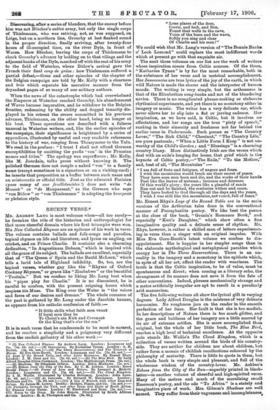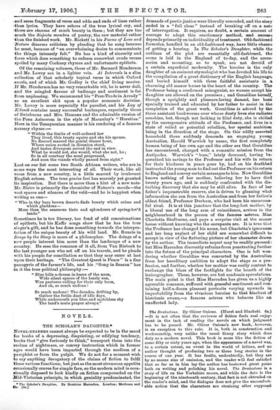RECENT VERSE.*
Mn. ANDREW LANG is most welcome when—all too rarely—
he forsakes the role of the historian and anthropologist for that more cheerful domain where his first triumphs were won.
His New Collected Rhymes are an epitome of his work in verse. The volume contains ballads and folk-songs and parodies, topical rhymes on life and literature, and lyrics on angling, on cricket, and on Prince Charlie. It contains also a charming dedication, "In Augustinum Dobson," which is inspired with all the grace of its subject. The ballade are excellent, especially that of "The Queen o' Spain and the Bauld McLean," which tells a lurid tale of Highland infidelity. So, too, are the topical verses, whether gay like the "Rhyme of Oxford Cockney Rhymes," or grave like " Zimbabwe " or the beautiful " Tusitala." But we confess to liking Mr. Lang best when his "pipes play for Charlie." It is no discontent, he is careful to confess, with the present reigning house which inspires his Muse. The King over the Water is "the voices and faces of our desires and dreams." The whole romance of the past is gathered by Mr. Lang under the Jacobite banner, as appears from his catholic confession of faith :—
"It little skills what faith men vaunt If loyal men they be
To Christ's am n Kirk and Covenant Or the King that's o'er the sea."
It is in such verse that he condescends to be most in earnest, and he reaches a simplicity and a poignancy very different
from the modish gallantry of his other work :—
(1) New Collected Rhymes. By Andrew Lang. London : Longmans and Co. [4e. 6d. net.]—(2) Innocencies. By Katharine Tynan. London : A. H. Bullen. [Sc. 6d. net.]—(3) The Three Resurrections, and The Triumph of Maeve. By Eva Gore-Booth. London Longmans and Co. [3s. 6c1. net.]— (4) Lays of the Round Table, and other Lyric Romances. By Ernest Ehys. London : J. M. Dent and Co. [3s. 6d. net. l—(5) The Blue Bird. By Lady Alfred Douglas (Olive Custance). London : The Marlborough Press. [5s. net.]
—(6) Shadow. By vIlmbeth Gibson. London Elkin Mathews. [1s. net.]
—(7) Echoes from the City of the Sun. By C. E. Ashbee. London : Essex HOMO Press.—(8) Poems of Love and Nature. By Leonard A. Eickett. London : Longmans and Co. [3s. 6d. net.—(9) The Cloud Kingdom. By I. H. Wallis. Illustrated by Charles Robinson. London : John Lane. [4s. 6d. net.]— (10) At Intervals. By Bernard W. Henderson. London : Methuen and Co. [29. 6d. net.1—(11) Lay of Kilcock, with other Lays and Relays. By James M. Lowry. Dublin: Hodges, Figgie, and Co. [Is. net,)— (12) Footpaths through the Veld, and other Songs and Idylls of South Africa. By Francis Carey Slater. London : W. Blackwood and Sons. [Sc. net.]— (13) Songs by the Steep. By John Runde. Illustrated by South African Artists. London : B. A. Thompson and Co. [3s. 6d.] "Lone places of the deer, Corrie, and loch, and Ben, Fount that wells in the cave, Voice of the burn and the wave, Softly you sing and clear Of Charlie and his men 1"
We could wish that Mr. Lang'seversion of "The Bonnie Banks.
o' Loch Lomond" could replace the most indifferent words which at present go with that exquisite air.
The next three volumes on our list are the work of writers whose inspiration comes from Celtic sources. Of the three, "Katharine Tynan" is by far the most remarkable, both in the substance of her verse and in metrical accomplishment. Her Innocencies are true lyrics of the joy of the earth, in which wild Nature is made the sharer and the interpreter of human. moods. The writing is very simple, but the artlessness is that of the Elizabethan song-books and not of the blundering novice. There is no complicated phrase-making or elaborate rhythmical experiments, and yet there is no monotony either in imagery or music. The writer has a very delicate ear, which never allows her to slip into a flat or jarring cadence. Her inspiration, as we have said, is Celtic, but it involves no affectations, and her songs are the true "piety of speech," ranking in their sincerity and freshness not far behind the earlier verse in Underwoods. Such poems as "The Country Lover," "The Sick Child," "Chestnut," "The Country Life," are pure pastorals ; "When a Little Farm I Keep" is not un- worthy of the Child's Garden ; and " Blessings " is a charming country litany. More distinctively Irish are the verses which deal with an exile's longing for home, that grief which is the keynote of Celtic poetry,—" The Exile," "To the Mother,'' and, best of all, "The Mountains" :—
" I am full of frets and fatigues, of angers and fears.
I wish the mountains would teach me their secret of peace.
They have seen men born and die, and the works of their hands- Pass like the leaves of autumn ; increase and decrease Of this world's glory ; the years like a glassful of sands Run out and be finished, the centuries wither and cease.
They have looked to God through all the days and the years.
I wish I was still like the mountains, not vexed, full of fears."
Mr. Ernest Rhys's Lays of the Round Table are in the main versions of the Arthurian tales done in the conventional manner of Preraphaelite poetry. We like best the poems at the close of the book, " Grania's Romance Book," and. especially "Ken's Daughter," which show often a fine
imaginative quality and a delicate sense of rhythm. Mr. Rhys, however, is rather a skilled man of letters experiment- ing in verse than a singer with an original impulse. With Miss Eva Gore-Booth's latest volume we confess to dis- appointment. She is happier in her simpler songs than in the elaborate mythological and metaphysical parables which occupy her in The Three Resurrections. There is an un- reality in the imagery and a monotony in the epithets which, in spite of all her art, affect the reader with weariness. The truth is that the Celtic inspiration, to be of value, must be spontaneous and direct; when coming as a literary echo, the strangeness of its manner does not save it from the fate of other conventions. Indeed, phrases mechanically strange and a metre artificially irregular are apt to result in a peculiarly
arid mannerism.
The five following writers all show the lyrical gift in varying
degrees. Lady Alfred Douglas is the mistress of very delicate harmonies. No roughness jars on the reader in the smooth perfection of her lines. Her fault is that she is too modish. In her descriptions of Nature there is too much glitter, and the grace and boldness of her imagery are a little marred by its air of extreme artifice. She is more accomplished than original, but the whole of her little book, The Blue Bird, reaches a high level of technical excellence. At the opposite pole stands Mr. Wallis's The Cloud Kingdom, which is a. collection of verses written around the birds of his country.
side. They are neither for children nor about children, but rather form a mosaic of childish recollections coloured by the philosophy of maturity. There is little to quote in them, but the whole book is very simple and pleasant, and full of the wholesome wisdom of the country-lover. Mr. Ashbee's
Echoes from the City of the Sun—superbly printed in black. letter—is another volume of cheerful and high-spirited verse. Many of the metres and much of the moralising recall Emerson's poetry, and the ode "To Africa" is a stately and imaginative piece of work. Mrs. Gibson's Shadows are well named. They suffer from their vagueness and incompleteness.
and seem fragments of verse and wide and ends of lines rather :than lyrics. They have echoes of the true lyrical cry, and there are stanzas of much beauty in.them ; but they are too -much the disjecta membra of poetry, the raw material rather
than the finished work. Mr. Rickett in his Poems of Love and -Nature disarms criticism by pleading that he sang because- be must, because of "an overwhelming desire to communicate- the things intensely felt." He has a kind of sincerity and
force which does something to redeem somewhat crude verses spoiled by many Cockney rhymes and unfortunate epithets.
Of the remaining volumes, those of Mr. Bernard Henderson and Mr. Lowry are in a lighter vein. At Intervals is a slim collection of that scholarly topical verse in which Oxford
'excels, and of which Mr. Godley is the chief living master. If Mr. Henderson has no very remarkable wit, he is never dull, and the mingled flavour of badinage and sentiment is far -from nnpleasing. We recommend his "Free-Trade in Arcady" -as an excellent skit upon a popular economic doctrine. Mr. Lowry is more especially the parodist, and his Lay of
Kilcock contains many successful burlesques, especially those of Swinburne and Mrs. Hemans and the admirable version of the Pons Asinornm in the style of Macaulay's " Horatius." Here in the Tennysonian manner is his rendering of a famous nursery rhyme :— "Within the limits of well-ordered law They lived, this trusty squire and eke his spouse. No discord marred the genial dinner hour, Where union rooted in disunion stood, And tastes divergent served the end in view. What he would not, she would, what she not, he; So in all courtesy the meal progressed, And soon the viands wholly passed from sight."
Last on our list come two South African writers, who are in some ways the most interesting of all. Their work, like all Terse from a new country, is a little marred by irrelevant
English echoes. The true genius loci has scarcely yet granted its inspiration. But there is more than a hint of a new note- Mr. Slater is primarily the chronicler of Nature's moods—the -vast spaces and silences of the veld—and he is happiest when writing as one— "Who in thy bare brown deserts finds beauty which calms and which gladdens—
More than the sensuous tints and splendours of spring-lov'd lands."
Sometimes he is too literary, too fond of odd concatenations -of epithets, but his Kaffir songs show that he has the true singer's gift, and he has done something towards the interpre-
tation of the unique beauty of his wild land. Mr. Runcie in Songs by the Steep is more of a philosopher. The doings of a new people interest him more than the landscape of a new country. He sees the romance of it all, from Van Riebeek to the last younger son who set off on his travels, and he pleads with his people for conciliation so that they may enter at last upon their heritage. "The Greatest Quest is Peace" is a fine amnegyric of the farmer's life, and his ,"Song in Season" has in it the true political philosophy :— " Blue hills a-dream in hazes of the noon, Wide silent spaces of the lonely sun, Wan pastures calling for their only boon, And oh, so much undone !
So much undone ! The decades, drifting by, Gather the futile dust of idle days, While underneath yon blue and matchless sky The land's mute_ prayer always."











































 Previous page
Previous page